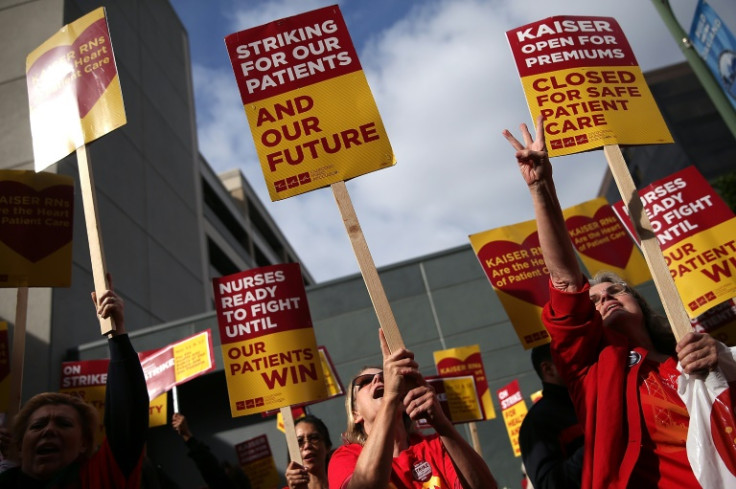US Medical Workers Respond To Delayed Contract Agreement By Launching Biggest Strike Yet
A reported 75,000 staff who work under Kaiser Permanente have united in a huge strike action, impacting nearly 13 million patients in a call for better wages and working hours.

Yesterday morning, Wednesday 4 October, tens of thousands of medical workers in the United States abandoned their job posts.
The strike action, which saw more than 75,000 staff from Kaiser Permanente, the largest non-profit healthcare organisation in the US, marks the largest walkout of health workers in the history of the US.
The strike is in response to a delayed contract agreement between Kaiser Permanente and a coalition of eight unions. The Coalition of Kaiser Permanente Unions is calling for the California-based company to address staff shortages and for better wages.
Since the Covid-19 pandemic in 2020, the staff of Kaiser Permanente have been immensely understaffed.
X-ray technician Armando Velasco told reporters: "Ever since the pandemic hit, we lost a lot of members, and we never recovered them."
"Kaiser has not been bargaining with us in good faith and so it's pushing us to come out here and strike. We want to be inside just taking care of our patients," Jacquelyn Duley, a radiologic technologist among the hundreds of picketers at Kaiser Permanente Orange County – Irvine Medical Center added.
The coalition of unions has repeatedly pointed at Kaiser Permanente's huge profits that amounted to around $3 billion in the first half of 2023 – equal to £2.47 billion.
In a statement that was published by the coalition in July, the group declared that the firm's CEO generates a $16 million income each year – equal to £13.18 million. The coalition also loudly claims that the 49 executives earn more than $1 million each year – equal to £820,000.
The Executive Director of the Coalition of Kaiser Permanente Unions, Caroline Lucas, told the press: "These kinds of conditions mean that things that could be preventable and caught in time become crises."
Lucas went on to urge the healthcare firm has refused to "listen to frontline health care workers", adding that "our frontline health care workers had no choice but to escalate that issue outside of the hospitals".
This morning at 6 a.m. Pacific health care workers at Kaiser Permanente walked out on strike.
— More Perfect Union (@MorePerfectUS) October 4, 2023
75,000 workers just launched the biggest strike the U.S. health care industry has ever seen. pic.twitter.com/0646ATKkY2
In a statement published yesterday, the coalition revealed: "Currently, the strike continues, and there are no sessions scheduled at this hour."
In California, Oregon, Colorado and Washington state, the strike is set to take place over the next three days and involves nurses, pharmacists and lab technicians across all of the five US states and the capital, Washington DC.
It has been estimated that the historic action will impact nearly 13 million patients in hospitals across the country, but the facilities and emergency departments will remain open with a minimal number of staff working.
In response to the mass walk-out, Kaiser Permanente reassured the public that "contingent workers" would be carrying out non-essential services like routine check-ups. All elective procedures will be rescheduled, according to Kaiser Permanente.
Kaiser Permanente has also prepared for the strike by expanding its network of pharmacies to tend to the customers who find that their local outpatient pharmacy has been closed during the action.
This year, in just 10 months, the US has seen more than 453,000 union workers participating in 312 strikes across the nation, reported Johnnie Kallas, the Project Director of Cornell University's Labor Action Tracker.
Backing the coalition of workers, Kallas explained: "I do think there's a deep connection between what health care workers had to go through on the front lines of a global pandemic."
In regard to the lifesaving work carried out by healthcare staff during the COVID-19 pandemic, Kallas declared: "They really deserve a lot more in terms of pay, staffing, workplace health and safety."
This month, healthcare workers in the UK also took part in a historic strike action that called for better working hours and increased wages.
The mass walk-out marked the first-ever double strike amongst NHS staff in the UK.
© Copyright IBTimes 2025. All rights reserved.






















